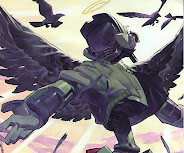 The Tokyo Game Show (TGS) is happening! From the 20th to the 23rd, game companies from all around the world will be getting together to show off their new products at the biggest electronic entertainment show in the world. Because it’s such a big deal, people are constantly blogging about TGS. I commented on two blogs that posted about TGS. The first is GigaOm where Jane Pinckard writes about some disappointments and a few surprises she experienced at TGS in a post titled "Tokyo Game Show: A Clouded Vision In A Web 2.0 World?"
The Tokyo Game Show (TGS) is happening! From the 20th to the 23rd, game companies from all around the world will be getting together to show off their new products at the biggest electronic entertainment show in the world. Because it’s such a big deal, people are constantly blogging about TGS. I commented on two blogs that posted about TGS. The first is GigaOm where Jane Pinckard writes about some disappointments and a few surprises she experienced at TGS in a post titled "Tokyo Game Show: A Clouded Vision In A Web 2.0 World?"I also commented on a post at Joystiq.com where Scott Jon Siegel writes about ThatGameCompany’s new game fl0wer in a post called "Today's most flowery video: 'fl0wer' trailer." The only thing we have seen of it yet is the trailer, but that is enough for me to be excited. The game is made by our very own USC Grad Jenova Chen and his team. I related some information behind Jenova’s initial thesis behind fl0w and expressed my hope that it would be up to par with his previous games.
You can visit the blogs and articles via the links, and you can read my comments on those articles posted below.
Comment:
Jane, I agree with you. It seems that since last year, not too much has been going on in the gaming world. After the next generation systems came out, I was hoping that this year would bring us much more new and innovating things that people have played around with the new hardware to get. But as you pointed out, it seems as though they are just reiterating everything they did on their old systems and updating it for the new ones.
In an era where films and books tend to keep adding on to an original and making a second and third iteration of a hit film, are games being sucked into that as well? I hope not, but at the moment it seems a little disappointing. Now it’s true there are some exciting things happening, but after last year they don’t seem quite as innovative. I was hoping the Wii and its control style would provoke developers to innovate new game genres and interesting ways to play around with the Wiimote. I have not given up hope completely though hearing about the rise of Rez. I just hope the TGS doesn’t follow in the tracks of E3.
Comment:
It seems to me that this game is following right in the vein of fl0w. fl0w was a san
 dbox game, with such an amount of freedom, the player gets to choose how hard or easy the game play is. fl0w was based on the flow theory of games based on the research of psychologist Mihaly Csikszentmihalyi. Basically, it says that for the player to feel the most satisfaction in a game, the abilities of the player and the challenge of the game need to correspond. I think these games are so innovative because they allow the player to determine the challenge of the game as their abilities grow or not.
dbox game, with such an amount of freedom, the player gets to choose how hard or easy the game play is. fl0w was based on the flow theory of games based on the research of psychologist Mihaly Csikszentmihalyi. Basically, it says that for the player to feel the most satisfaction in a game, the abilities of the player and the challenge of the game need to correspond. I think these games are so innovative because they allow the player to determine the challenge of the game as their abilities grow or not.Personally, I’m very excited to see where they go with this. Jenova Chen and his team are incredibly innovative in my mind and their games are so beautiful. It might not be very action oriented, but I’m content to play a game and sit in wonder of the beautiful visuals and simplistic gameplay they make. I thought that the first game was quite a success in what it was trying to do, but I can definitely see how it might have gotten boring if the players didn’t challenge themselves enough or their skills exceeded the maximum challenge the game had. Either way I’m sure this game will be a fuller and more developed game with the same core and feeling as the first. As I said before, I’m very excited to see how this turns out.



